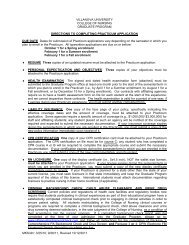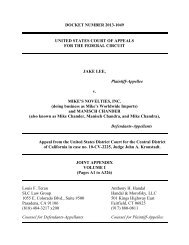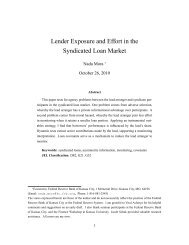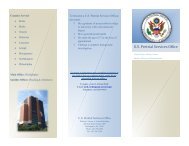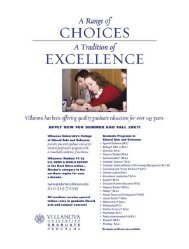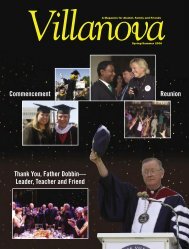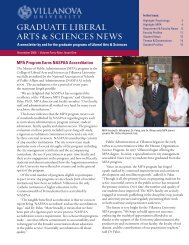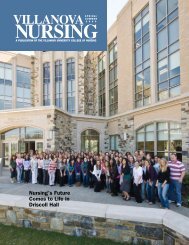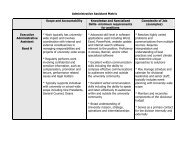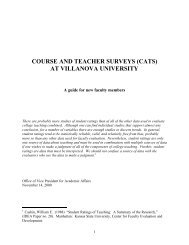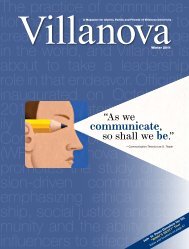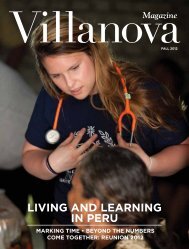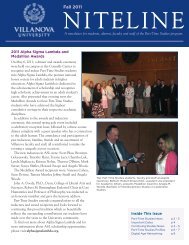AthleticsCoaches Team up toTalk About TeachingBY ANTHONY MAALOUF ’08 G.S.JOHN WELSH (ALL)Head Coach Andy Talley uses variousassessments in encouraging football teammembers to set goals.all-day workshop for facultyon May 17, WildcatAtancoaches discussed their ideasfor motivation, mentoring and teachingstudents. Titled “Winning Approaches:<strong>Villanova</strong> <strong>University</strong> Athletic CoachesShare Successful Teaching Strategies,”the panel was sponsored by the <strong>Villanova</strong>Institute for Teaching and Learning(VITAL).Dr. Carol A. Weiss, director of VITAL,introduced the panel. The moderator wasDr. Ray Heitzmann ’64 A&S, professor ofeducation and human services. The panelistswere coaches from various teams:Joanie Milhous, head coach for fieldhockey; Shanette Lee ’95 A&S, assistantcoach of women’s basketball; Andy Talley,head coach of football; and Jay Wright,head coach of men’s basketball.Now in her 13th year of coaching fieldhockey at <strong>Villanova</strong>, Milhous told theaudience that attitude mattered.“Students will watch everything youdo, from the moment you walk into yourclassroom up to the last minute,” Milhoussaid. She recalled a time when she waskicking around a water bottle during apractice, simply for exercise. When theteam members saw that, it affected theirplay, according to the coach. “Theythought that I was mad at the players,” sherecalled, “and when I asked them wherethey got that idea, they said it was mykicking the bottle.”Milhous emphasized the importance ofprojecting a positive attitude. “Your attitudeis contagious,” she concluded. “Itneeds to be positive; otherwise studentswill not do their best.” She has a policy ofnot recruiting field hockey players withbad attitudes, no matter how talented orskillful they are, because bad attitudes arejust as contagious as good ones.Mentorship was the focus of Lee’s talk.She recalled a time when one of the women’sbasketball student-athletes did not showup for some of her classes, prompting herprofessor to call the coach’s office. HeadCoach Harry Perretta ’95 G.S. referredAssistant Coach Shanette Lee ’95 A&S recalls a time when she mentored a member of thewomen’s basketball team. Joanie Milhous, head coach of field hockey, and Dr. Ray Heitzmann,the moderator, also took part in the panel.the situation toLee, whoapproached thestudent. “Shewas not feelinggood aboutherself, so IFor faculty and coaches,sharing ideas is the key tosuccess, said Jay Wright,head coach of men’sbasketballgave her some positive reinforcement.Sometimes, we need to do that as teachersand coaches for our students,” Lee told thefaculty. Giving students a motivational pushwith comments like “We want you to behere” are a must, Lee said.“Sure, college students are adults, butlet’s not forget that they are young adultsand need good mentorship from their rolemodels, like you,” Lee reminded the audience.Sometimes, coaches and facultyshould step out of their professional rolesand offer to sit down with a student anddiscuss his or her feelings, she suggested.As for the team member Lee mentored,she got back on track in both her classesand her play. “In fact, she helped us win aBig East championship that year,” Lee saidwith a smile.Talley in his remarks said he starts thefootball team off with a self-assessment testright at the beginning of training. It isimportant to get to know the students aspeople, not just as athletes, he told the faculty,adding that as a coach, he especiallywants to know with whom he is working.“We look at many things about our players,like their personality and how theylearn, either by audio, visually or kinesthetically”[hands-on experience], Talley said.The football coach also gives the student-athletesa chance to do an assessmentof their team and of themselves as individuals.“We ask them to set goals and list them,giving them something to aim for duringthe season,” he explained. Coaches, accordingto Talley, have a responsibility to helpstudents see their goals fulfilled and shouldguide them accordingly. Everyone, he said,“needs this guidance.”However, there are some exceptions,Talley added. A student-athlete like BrianWestbrook ’00 VSB had no problem66 <strong>Villanova</strong> Magazine
eaching his objectives. Such exceptionshowever, do not come on a daily basis, thefootball coach said.Wright began his presentation acknowledgingthe importance of sharing ideas,joking that he was going to steal the testthat Coach Talley had just talked aboutand use it for the men’s basketball team. Itis the sharing of ideas, Wright continued,that leads to success. What separates <strong>Villanova</strong>from many other institutions, hesaid, is that there is a high level of sharingideas—among coaches, among faculty andbetween the two groups.“The faculty, like Dr. Heitzmann, contributesgood ideas to our team,” Wrightsaid, giving a nod to the moderator.To expect a full effort from the students,Wright emphasized, faculty mustshow that same effort. “So, be enthusiastic,”he said. “It is one of the most importantingredients in teaching. The studentsare going to watch you and what you aredoing in and outside of that classroom.They will give back to you what you giveto them,” Wright added, echoing a pointmade by Milhous.The men’s basketball head coach concludedhis talk by encouraging new ideas,stating that the fear of failure should nothinder the ability to try new methods andtechniques.Heitzmann, a former coach and authorof several books, both on athletics andacademics, gave the closing comments. Heemphasized teacher enthusiasm as the bestway to enhance student performance.During a Q&A session, the coacheselaborated on some of their ideas. Theyaddressed the issue of radio host Don Imus’controversial comments about the Rutgers<strong>University</strong> women’s basketball team duringan April broadcast of his program(CBS later fired Imus).The coaches also reflected on timeswhen former Wildcats have returned to<strong>Villanova</strong> and even helped mentor teams.In particular, Talley recalled HezekiahLewis ’98 A&S, ’02 G.S., a former footballteam captain now working toward a doctoratein fine arts and directing film and televisionat UCLA. Lewis recently directedthe award-winning film “Memoirs of aSmoker,” which documents the life of drugaddicts in Los Angeles.“Harry [Perretta] is actually a proponentof maintaining close contacts withalumni,” said Lee, herself a former Wildcatwomen’s basketball team member. All ofCurtis Places Second in5,000m at NCAA FinalsBobby Curtis posted an amazing second-place finish onJune 8 in the finals of the 5,000m event at the NCAAOutdoor Track and Field Championships, held at CaliforniaState <strong>University</strong>, Sacramento. In this race, Curtis, ared-shirted senior, put forth a truly courageous effort but eventuallyfell just short of Wisconsin’s Chris Solinsky. Despite justmissing the title, Curtis managed to set a personal best with atime of 13:39:88, shaving four seconds off his previous mark.“Bobby ran a terrific race,” said Marcus O’Sullivan ’84 VSB,’89 M.B.A., who is the Frank J. Kelly Endowed Track and FieldCoach. “He has made tremendous progress, and we are all reallyproud of him, as well as all of his accomplishments.”Curtis and Michael Kerrigan ’07 VSB were both thrilledthis spring to break the 4-minute mile. It was a milestone for<strong>Villanova</strong> track and field to achieve this in the same race, andit was a personal best for the two runners. During the LastChance Meet at Swarthmore College on May 14, Curtis ranthe mile in 3:57.20 and Kerrigan in 3:59.60. “It has alwaysbeen a dream of mine to accomplish,” noted Kerrigan.(Right) A cross country and distance runner, Bobby Curtis achieved a personal best at theNCAA Outdoor Track and Field Championships in June. He is majoring in economics.the coaches agreed that seeing formerteam members return to <strong>Villanova</strong> is oneof the best parts of the job.Dr. Mark Doorley was among the facultyand staff members who said they leftthe session with some good input. “Thispresentation made me aware that there’s alot more going on between coaches andtheir students than justwinning a game,” henoted. Doorley is an associateprofessor of ethicsand director of the EthicsProgram in the Collegeof Liberal Arts and Sciences.He also indicatedthat both faculty andcoaching staff have ashared purpose in teachingand mentoring students.“We’re not in twoseparate tracks but reallyworking as a team,”Doorley said.Dr. Helen K. Lafferty,<strong>University</strong> vice president,also attended the session.She commented that the<strong>University</strong> has excellentcoaches who not only know what is goingon in the games but also are attentive totheir students’ needs. “While they want towin the game, they never put this overconcerns for their students,” she said.For further information on this or othersessions presented by VITAL, visit www.villanova.edu/vital/<strong>2007</strong> <strong>Villanova</strong> Football ScheduleSeptember1 Maryland College Park, Md. 6 p.m.8 Lehigh Bethlehem, Pa. 1 p.m.15 Maine <strong>Villanova</strong>, Pa. 6 p.m.22 Penn <strong>Villanova</strong>, Pa. 6 p.m.29 James Madison Harrisonburg, Va. NoonOctober6 William & Mary <strong>Villanova</strong>, Pa. 6 p.m.13 Massachusetts Amherst, Mass. 1 p.m.27 Hofstra <strong>Villanova</strong>, Pa. 3:30 p.m.November3 Richmond Richmond, Va. 3:30 p.m.10 Towson Towson, Md. Noon17 Delaware <strong>Villanova</strong>, Pa. 3:30 p.m.Summer <strong>2007</strong> 67



